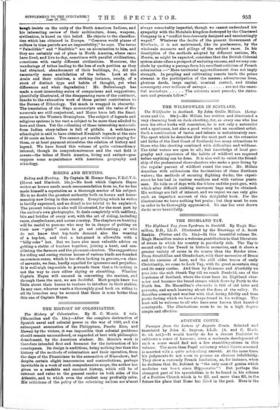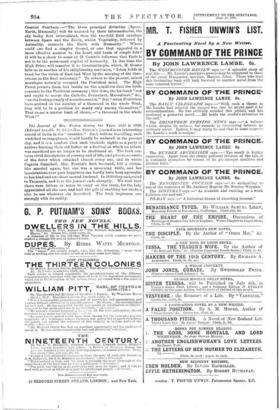AUGUSTE COMTE.
Passages from the Letters of Auguste Comte. Selected and translated by John K. Ingram, LLD. (A. and C. Black. 3s. Cd. net.)—It would hardly do for a devout Positivist to cultivate a sense of humour; even a moderate development of such a sense would find not a few stumbling-stones in this volume. The more than Papal autocracy which Comte assumed is asserted with a quite aatonishing naivete. At the same time, his judgments do not aasm to possess an obvious infallibility. They show a curiously French limitation, as, for instance, when be declares that Dr. Robinet is •` the only man of genius which medicine can bovt since Hippocrates" ! But perhaps the strangest part of his speculations is to be found in his scheme of a Positive Church which is to fill, and more than fill, in the future the place that Rome has filled in the past. Here is tho
Comtist Pantheon :—" The three principal divinities [Space, Earth, Humanity] will be assisted by their intermediaries, the sky being first intercalated, then the two-fold fluid envelope between Space and the Earth, whilst Vegetality, followed by Animality, connects the Earth with Humanity." Where could one find a simpler Gospel, or one that appealed in a more effective manner to the heart and brain of simple folk? It will be a shock to some of M. Comte's followers that Paris is not to be the permanent capital of humanity. In due time the High Priest will transfer it to Constantinople, which, M. Comte tells us in another of his enlightening sentences, "Islam holds in trust for the union of East and West by the merging of the theo- cracies in the final sociocracy." To return to the present, mixed marriages naturally occupied the Pontifical mind. The High Priest permits them, but insists on the condition that the bride consents to the Positivist ceremony ; this done, the husband "can and ought to accept the Catholic, Protestant, Mussulman." &c., "on the footing simply of a condescension." But " when Positivists have arrived at the number of a thousand in the whole West, they will be in a position to marry only among themselves." That seems a narrow limit of choice,—" a thousand in the whole West ! "





















































 Previous page
Previous page